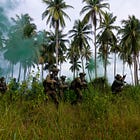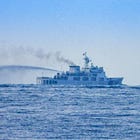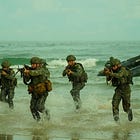Why do Filipinos refuse to take to the streets, like Indonesians?

Protests had erupted in several cities in Indonesia, sparked by the lavish perks enjoyed by lawmakers, including housing and travel allowances. The allowances were about ten times higher than the minimum wage for ordinary Indonesians.
The protests further intensified after a video showed that a motorcycle taxi driver was killed when he was run over by a police vehicle at a rally against the luxurious lifestyle of lawmakers. At least four more people have died in the violent protests, with looting and destruction of private properties. The home of Indonesia’s finance minister was attacked by a mob and looted, forcing President Prabowo Subianto to announce deep cuts in lawmakers’ perks.
The military and police were mobilized to end the violence in the streets, prompting the Philippine embassy in Jakarta to issue an advisory warning Filipinos to stay away from protest areas. Corruption is becoming a significant issue in Southeast Asia, particularly in Indonesia, the Philippines, and Singapore.
Truth matters. Quality journalism costs.
Your subscription to Mencari (Australia) directly funds the investigative reporting our democracy needs. For less than a coffee per week, you enable our journalists to uncover stories that powerful interests would rather keep hidden. There is no corporate influence involved. No compromises. Just honest journalism when we need it most.
People are angry that while millions wallow in poverty, powerful politicians live an extravagant lifestyle, with designer clothes and bags, jewelry, luxury vehicles, and travel overseas. Thirty-nine years ago, the Philippines was the world’s brightest and shining beacon of justice and democracy.
For four days in a cool February, Filipinos showed the world how a peaceful and popular protest had removed a brutal dictator from power. Corruption was one of the biggest issues against he late former President Ferdinand Marcos Sr. He was also accused of widespread human rights abuses. Marcos, his family, and cronies had amassed unimaginable wealth for staying in power for nearly two decades.
It was estimated that the Marcos’ ill-gotten wealth could have stashed more than $10 billion. Only about half had been recovered by the Presidential Commission on Good Government (PCGG), an agency created to recover the ill-gotten wealth. Angered at corruption in high places in government, Filipinos collectively and spontaneously took to the streets, and with help from the military, ended the Marcos dictatorship, the darkest period in Philippine history.
The “EDSA People Power” uprising in 1986 inspired similar democracy protests in other places, like Myanmar and Europe. In August and September two years after the EDSA uprising in Manila, students led the protests in Yangon due to the military-led government's imposed economic policies, which resulted in hardships in contrast with the generals’ lavish lifestyle. The junta responded brutally and jailed thousands of protesters.
There was a brief period when democracy leader Aung San Suu Kyi led the government, but she was ousted by the military and continued to rule. In November 1989, millions gathered and tore down the Berlin Wall in Germany, which led to the unification of East and West Germany.
Filipinos reprised the peaceful protest in January 2001 to force former President Joseph Estrada to resign, and helped Vice President Gloria Macapagal Arroyo rise to power. Corruption sparked the protest against Estrada after a governor had exposed millions of pesos in kickbacks in tobacco taxes and payoffs from illegal gambling operations. Arroyo failed to stop corruption during her watch.
Her political opponents had filed five motions to impeach her, but failed due to election fraud and corruption. She was accused of bribery in an overpriced China-led national broadband project and fattening the senators and congressmen through the PDAF funds.
Arroyo was the most unpopular president; her approval rating sank to minus 50, the worst rating among presidents since 1986. Congress faced corruption charges anew due to defective and ghost flood control projects worth billions of pesos. Some congressmen were linked to corrupt government engineers and unscrupulous contractors in awarding contracts for non-existent and sub-standard infrastructure projects.
Some senators also accepted substantial donations from government contractors, a serious violation of the election law. The controversy worsened when family members of lawmakers and contractors posted online their palatial homes, lavish travels abroad, designer clothes, bags, watches, and imported cars. But why do Filipinos refuse to take to the streets? When Janet Napoles’ pork barrel schemes were exposed during the Aquino administration, hundreds of thousands of people marched to Luneta to denounce the lawmakers’ kickbacks.
Three senators - Juan Ponce Enrile, Ramon Revilla, and Jinggoy Estrada - were arrested and jailed for involvement in the PDAF scandal. Where is the public outrage now? Are Filipinos are already used to corruption that they accepted it as a way of life? Are they contended with the meager financial aid that they could turnn a blind eye on corruption?
Filipinos should not turn to social media to vent their anger, they must show their disgust and condemnation in the streets. Before the Indonesians, the Filipinos were the first to protest against corruption in 1986. Filipinos were the models for peaceful protests that led to peaceful regime change. President Ferdinand Marcos Jr should take the lead in holding lawmakers, government servants, and private businessmen accountable.
Marcos could redeem his family’s honor if he could stop corruption not only in government’s infrastructure but in all projects in health, education, and social services. Marcos can start a revolution from within to lead a clean and gpod government. The people is waiting for results. Probably, there is no need for street protests if crooks get charged and jailed.
The opinions expressed are those of the author and do not necessarily represent the views of this publication.
Got a News Tip?
Contact our editor via Proton Mail encrypted, X Direct Message, LinkedIn, or email. You can securely message him on Signal by using his username, Miko Santos.
Sustaining Mencari Requires Your Support
Independent journalism costs money. Help us continue delivering in-depth investigations and unfiltered commentary on the world's real stories. Your financial contribution enables thorough investigative work and thoughtful analysis, all supported by a dedicated community committed to accuracy and transparency.
Subscribe today to unlock our full archive of investigative reporting and fearless analysis. Subscribing to independent media outlets represents more than just information consumption—it embodies a commitment to factual reporting.
Not ready to be paid subscribe, but appreciate the newsletter ? Grab us a beer or snag the exclusive ad spot at the top of next week's newsletter.






